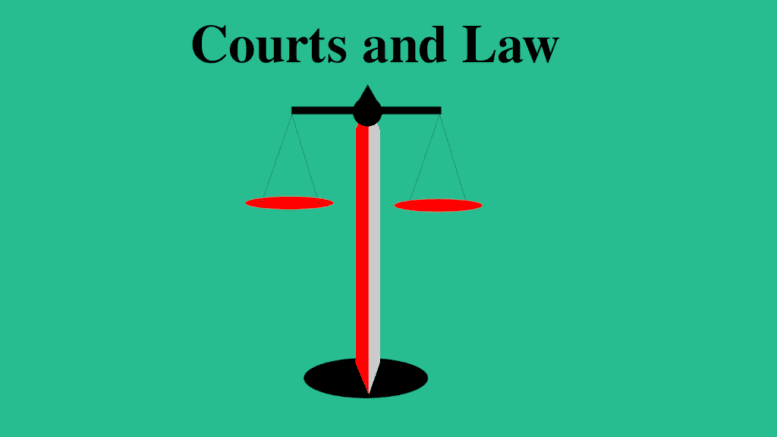[Correction: At several places in the original article we mis-typed the Times Journal as the Times-Union. The error was pointed out to us by JK Murphy, Editor of the Times Journal, which makes the error both regrettable and embarrassing. Needless to say, we regret the error — LFJ]
On November 12, Times-Journal, Inc., the parent company of the Marietta Daily Journal, filed suit against Google and Facebook in the U.S. District Court for the Northern District of Georgia, alleging antitrust violations on the part of the search engine and social media giants.
The suit alleges that Google uses its position of dominance in the search engine world to maintain a monopolistic hold on the revenue from digital ad sales. It also states that Google entered into an agreement with Facebook that further damages competition in the digital ad sales market.
The Times-Journal also owns the Calhoun Times, Cherokee Tribune, Morgan County Citizen, Polk Standard-Journal, Rome News-Tribune, Walker County Messenger, and the Neighbor chain of newspapers in metro Atlanta.
The lawsuit beings with a quote from Thomas Jefferson on the role of newspapers.
“[T]he basis of our governments being the opinion of the people, the very first
object should be to keep that right; and were it left to me to decide whether we should have a
government without newspapers, or newspapers without a government, I should not hesitate a
moment to prefer the latter.” Thomas Jefferson, Letter to Edward Carrington, Paris, Jan. 16, 1787
What does the lawsuit allege?
The lawsuit alleges that Google and Facebook exercise a digital advertising monopoly that damages the revenue streams of local newspapers.
The filing refers to a report from the U.S. House Judiciary Committee, Subcommittee on Antitrust, Commercial,
and Administrative Law on the committee’s antitrust investigation into the digital advertising market:
As set forth in the House Judiciary Report, Defendants’ anticompetitive and monopolistic practices have had a profound effect upon our country’s free and diverse press, particularly the newspaper industry. Since 2006, newspaper advertising revenue, which is critical for funding high-quality journalism, fell by over 50%. Newspaper advertising has declined from $49 billion in 2006 to $16.5 billion in 2017. As a result of these falling revenues, the existence of the newspaper industry is threatened. Nearly 30,000 newspaper jobs disappeared—a 60% industry-
wide decline—from 1990 to 2016, according to the Bureau of Labor Statistics. And almost 20%
of all newspapers have closed in the past 15 years, and “countless others have become shells—or
‘ghosts’—of themselves,” according to the recent report by the University of North Carolina.
The lawsuit further states:
Plaintiff, and other newspapers across the country, compete for revenue in the digital advertising market. Google monopolizes the market to such extent that it threatens the extinction of local newspapers across the country. There is no longer a competitive market in which newspapers can fairly compete for online advertising revenue. Google has vertically integrated itself, through hundreds of mergers and acquisitions, to enable dominion over all sellers, buyers, and middlemen in the marketplace. It has absorbed the market internally and consumed most of the revenue. Google’s unlawful anticompetitive conduct is directly stripping newspapers across the country, including Plaintiff’s, of their primary revenue source.
Suit alleges anticompetitive conspiracy between Google and Facebook
The suit states that Google and Facebook reached a secret agreement in 2018 that avoids competition between the two:
Google and Facebook, archrivals in the digital advertising market, conspired to further their worldwide dominance of the digital advertising market in a secret agreement codenamed “Jedi Blue.” The two archrivals, who are sometimes referenced as operating a duopoly in the market, unlawfully conspired to manipulate online auctions which generate digital advertising revenue. Facebook and Google agreed to avoid competing with another in September.
The quid pro quo was as follows—Facebook would largely forego its foray into header bidding and would instead bid through Google’s ad server. In exchange, Google agreed to give Facebook preferential treatment in its auctions.
What is the Times Journal asking for?
The Times Journal is asking for a jury trial, with monetary damages to be determined during the trial.
The Times Journal attorneys summed up their demand for remedy as follows:
The allegations set forth herein are taken from the public record in the proceedings referenced above. If proven to be true, and as alleged herein, Google and Facebook have monopolized the digital advertising market thereby strangling a primary source of revenue for newspapers across the country. This antitrust action is brought to seek all remedies afforded under law.
The attorneys for the Times Journal sum up their request as follows:
WHEREFORE, Plaintiff requests the Court to enter judgment in its favor against Defendants, jointly and severally, awarding all such relief as the Court deems appropriate and just, including:
a) That the Court enter an order declaring that Defendants’ actions, as alleged herein,
violate the law;
b) That the Court award Plaintiff damages, treble damages, punitive damages, and/or
restitution in an amount to be determined at trial;
c) That the Court permanently enjoin Defendants, their affiliates, successors,
transferees, assignees, and other officers, directors, agents, and employees thereof
from continuing, maintaining, or renewing the conduct alleged herein, and from
adopting or following any practice, plan, program, or device having a similar
purpose or effect;
d) That the Court award Plaintiff pre- and post-judgment interest;
e) That the Court award Plaintiff its costs of suit, including reasonable attorneys’ fees
and expenses; and
f) That the Court award any and all such other relief as it may deem proper.


So, the news media business is dying and their big idea to save themselves is to sue those whose business model is thriving? I have zero sympathy for anyone who thinks there is any future in continuing with print media. Move your business online or shut it down. Those are their only 2 real options.